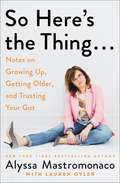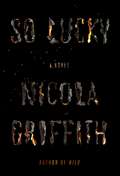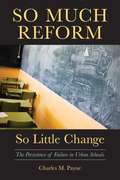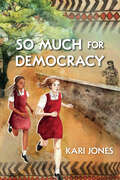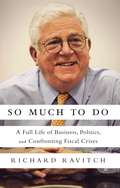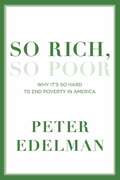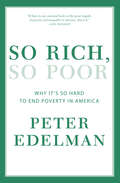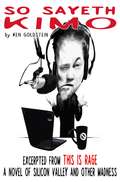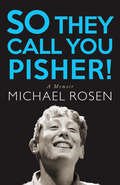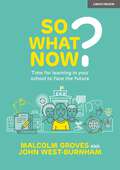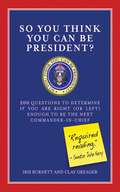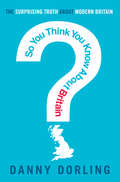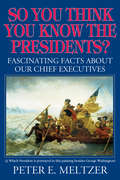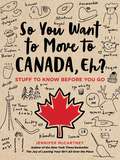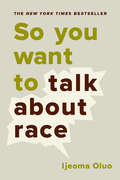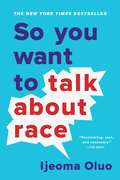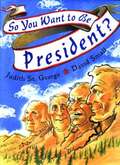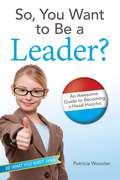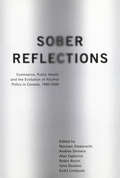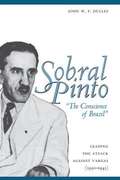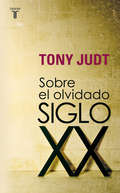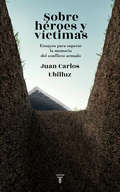- Table View
- List View
So Here's the Thing . . .: Notes on Growing Up, Getting Older, and Trusting Your Gut
by Alyssa MastromonacoFrom the New York Times bestselling author of Who Thought This Was a Good Idea? comes a fun, frank book of reflections, essays, and interviews on topics important to young women, ranging from politics and career to motherhood, sisterhood, and making and sustaining relationships of all kinds in the age of social media. p.p1 {margin: 0.0px 0.0px 0.0px 0.0px; font: 12.0px Helvetica} p.p2 {margin: 0.0px 0.0px 0.0px 0.0px; font: 12.0px Helvetica; min-height: 14.0px} Alyssa Mastromonaco is back with a bold, no-nonsense, and no-holds-barred twenty-first-century girl's guide to life, tackling the highs and lows of bodies, politics, relationships, moms, education, life on the internet, and pop culture. Whether discussing Barbra Streisand or The Bachelor, working in the West Wing or working on finding a wing woman, Alyssa leaves no stone unturned...and no awkward situation unexamined.Like her bestseller Who Thought This Was a Good Idea?, SO HERE'S THE THING... brings a sharp eye and outsize sense of humor to the myriad issues facing women the world over, both in and out of the workplace. Along with Alyssa's personal experiences and hard-won life lessons, interviews with women like Monica Lewinsky, Susan Rice, and Chelsea Handler round out this modern woman's guide to, well, just about everything you can think of.
So Lucky: A Novel
by Nicola GriffithFrom the author of Hild, a fierce and urgent autobiographical novel about a woman facing down a formidable foeSo Lucky is the sharp, surprising new novel by Nicola Griffith—the profoundly personal and emphatically political story of a confident woman forced to confront an unnerving new reality when in the space of a single week her wife leaves her and she is diagnosed with multiple sclerosis.Mara Tagarelli is, professionally, the head of a multimillion-dollar AIDS foundation; personally, she is a committed martial artist. But her life has turned inside out like a sock. She can’t rely on family, her body is letting her down, and friends and colleagues are turning away—they treat her like a victim. She needs to break that narrative: build her own community, learn new strengths, and fight. But what do you do when you find out that the story you’ve been told, the story you’ve told yourself, is not true? How can you fight if you can’t trust your body? Who can you rely on if those around you don’t have your best interests at heart, and the systems designed to help do more harm than good? Mara makes a decision and acts, but her actions unleash monsters aimed squarely at the heart of her new community.This is fiction from the front lines, incandescent and urgent, a narrative juggernaut that rips through sentiment to expose the savagery of America’s treatment of the disabled and chronically ill. But So Lucky also blazes with hope and a ferocious love of self, of the life that becomes possible when we stop believing lies.
So Much Reform, So Little Change: The Persistence Of Failure In Urban Schools
by Charles PayneThis frank and courageous book explores the persistence of failure in todays urban schools. At its heart is the argument that most education policy discussions are disconnected from the daily realities of urban schools, especially those in poor and beleaguered neighborhoods. Charles M. Payne argues that we have failed to account fully for the weakness of the social infrastructure and the often dysfunctional organizational environments of urban schools and school systems. The result is that liberals and conservatives alike have spent a great deal of time pursuing questions of limited practical value in the effort to improve city schools. <p><p> Payne carefully delineates these stubborn and intertwined sources of failure in urban school reform efforts of the past two decades. Yet while his book is unsparing in its exploration of the troubled recent history of urban school reform, Payne also describes himself as guardedly optimistic. He describes how, in the last decade, we have developed real insights into the roots of school failure, and into how some individual schools manage to improve. He also examines recent progress in understanding how particular urban districts have established successful reforms on a larger scale. <p> Drawing on a striking array of sourcesfrom the recent history of various urban school systems, to the growing sophistication of education research, to his own experience as a teacher, scholar, and participant in reform effortsPayne paints a vivid and unmistakably realistic portrait of urban schools and reforms of the past few decades. So Much Reform, So Little Change will be required reading for everyone interested in the plightand the futureof urban schools.
So Much for Democracy
by Kari JonesTwelve-year-old Astrid has come to Ghana with her family in 1979 so that her father can help oversee Ghana’s first democratic election. Astrid and her brother, Gordo, were told it would be a great family adventure, but they soon find out that everything about Ghana is difficult—the heat, the food, the threat of disease, the soldiers on the roads, the schools. Gordo fits in more easily than Astrid, who is often left to look after her baby sister, Piper, as their mother begins to fall apart under the strain of living in Ghana. When the government is overthrown, Gordo comes down with malaria and a soldier threatens her family, Astrid is surprised to discover how protective she has become of her new home.
So Much to Do: A Full Life of Business, Politics, and Confronting Fiscal Crises
by Richard RavitchEvery city and every state needs a Richard Ravitch. In sixty years on the job, whether working in business or government, he was the man willing to tackle some of the most complex challenges facing New York. Trained as a lawyer, he worked briefly for the House of Representatives, then began his career in his familyOCOs construction business. He built high-profile projects like the Whitney Museum and Citicorp Center but his primary energy was devoted to building over 40,000 units of affordable housing including the first racially integrated apartment complex in Washington, D. C. He dealt with architects, engineers, lawyers, bureaucrats, politicians, union leaders, construction workers, bankers, and tenants?virtually all of the people who make cities and states work. It was no surprise that those endeavors ultimately led to a life of public service. In 1975, Ravitch was asked by then New York Governor Hugh Carey to arrange a rescue of the New York State Urban Development Corporation, a public entity that had issued bonds to finance over 30,000 affordable housing units but was on the verge of bankruptcy. That same year, Ravitch was at CareyOCOs side when New York CityOCOs biggest banks said they would no longer underwrite its debt and he became instrumental to averting the cityOCOs bankruptcy. Throughout his career, Ravitch divided his time between public service and private enterprise. He was chairman of the Metropolitan Transportation Authority from 1979 to 1983 and is generally credited with rebuilding the system. He turned around the Bowery Savings Bank, chaired a commission that rewrote the Charter of the City of New York, served on two Presidential Commissions, and became chief labor negotiator for Major League Baseball. Then, in 2008, after Governor Eliot Spitzer resigned in a prostitution scandal and New York State was in a post-financial-crisis meltdown, SpitzerOCOs successor, David Paterson, appointed Ravitch Lieutenant Governor and asked him to make recommendations regarding the stateOCOs budgeting plan. What Ravitch found was the result of not just the economic downturn but years of fiscal denial. And the closer he looked, the clearer it became that the same thing was happening in most states. Budgetary pressures from Medicaid, pension promises to public employees, and deceptive budgeting and borrowing practices are crippling our statesOCO ability to do what only they can do?invest in the physical and human infrastructure the country needs to thrive. Making this case is RavitchOCOs current public endeavor and it deserves immediate attention from both public officials and private citizens. "
So Rich, So Poor: Why It's So Hard to End Poverty in America
by Peter EdelmanThe author slashes through the myths of poverty and welfare in America, to highlight what has changed since the "War on Poverty" of Lyndon Johnson, and what doesn't work and why.
So Rich, So Poor: Why It's so Hard to End Poverty in America
by Peter Edelman&“A competent, thorough assessment from a veteran expert in the field.&” —Kirkus Reviews Income disparities in our wealthy nation are wider than at any point since the Great Depression. The structure of today&’s economy has stultified wage growth for half of America&’s workers—with even worse results at the bottom and for people of color—while bestowing billions on the few at the very top. In this &“accessible and inspiring analysis&”, lifelong anti-poverty advocate Peter Edelman assesses how the United States can have such an outsized number of unemployed and working poor despite important policy gains. He delves into what is happening to the people behind the statistics and takes a particular look at young people of color, for whom the possibility of productive lives is too often lost on the way to adulthood (Angela Glover Blackwell). For anyone who wants to understand one of the critical issues of twenty-first century America, So Rich, So Poor is &“engaging and informative&” (William Julius Wilson) and &“powerful and eloquent&” (Wade Henderson).
So Sayeth Kimo
by Ken GoldsteinKen Goldstein's groundbreaking and conversation-starting novel THIS IS RAGE (published October 8, 2013) is getting tremendous advance attention:"THIS IS RAGE is that rare book - a fascinating, fast-paced, really smart thriller. Part action/adventure story set in the wilds of Silicon Valley, and part insider's exposition of some of the major inner workings of our contemporary economy and of the secrets of today's High Tech 'Masters of the Universe' - KenGoldstein succeeds in making this a debut that will make your heart race - even as it gives you plenty to think about."- Naomi Wolf, author of GIVE ME LIBERTY"I worked with Ken Goldstein at Disney: and since I knew he could write, I encouraged him to do just that, to write a novel. As impressed as I always was with him as an executive, I'm equally impressed with what he accomplished with a pen (or maybe a computer)."- Michael Eisner"Ken Goldstein knows the ins and outs of Silicon Valley - the customs of the land and where the bodies are buried. I would read anything he wrote, nonfiction or fiction, set on that fascinating terrain."- Will Schwalbe, author of THE END OF YOUR LIFE BOOK CLUB"Given Ken Goldstein's pedigree as a major Internet CEO whose vision has significantly shaped today's digital world, it's no surprise that his first novel takes us on a thrilling front-of-the-coaster rocket ride through the Valley of Silicon. While THIS IS RAGE is surely required reading for all high tech and deal-savvy action/thriller fans, it is an absolute crystal ball for radio broadcasters who are still scratching their heads as to the future of their industry."- Mitch Dolan, Former President, ABC Radio Station Group"Ken Goldstein has written a modern-day blockbuster! Smart, insightful, and engaging, the story takes us on a thrill ride through the circus-like madness of corporate American, the media, and government. It reveals with stunning clarity the inept and all-too-sinister characters that inhabit these worlds. You cannot help but think that Goldstein has had a front row seat and used his real life experiences to masterfully weave a fictional narrative that enlightens as much as it entertains. A must read."- Gene Del Vecchio, author of CREATING BLOCKBUSTERS! and Adjunct Professor, USC Marshall School of BusinessIn this extract from THIS IS RAGE, we meet Kimo Balthazar - one of the most unforgettable new characters in fiction - as he begins an odyssey that will have a profound impact on the American landscape.
So They Call You Pisher!: A Memoir
by Michael RosenThe brilliant family memoir of the much-beloved poet and political campaignerIn this hilarious, moving memoir, much-loved children’s poet and political campaigner Michael Rosen recalls the first twenty-three years of his life. He was born in the North London suburbs, and his parents, Harold and Connie, both teachers, first met as teenage Communists in the Jewish East End of the 1930s. The family home was filled with stories of relatives in London, the United States and France and of those who had disappeared in Europe. Different from other children, Rosen and his brother, Brian, grew up dreaming of a socialist revolution. Party meetings were held in the front room. Summers were for communist camping holidays. But it all changed after a trip to East Germany when, in 1957, his parents decided to leave ‘the Party’. From that point, Michael followed his own journey of radical self-discovery: running away to Aldermaston to march against the bomb; writing and performing in experimental political theatre at Oxford; getting arrested during the 1968 movements. The book ends with a letter to his father, and the revelation of a heartbreaking family secret.
So What Now? Time for learning in your school to face the future
by Malcolm Groves John West Burnham“It is not the role of schools to solve the climate crisis or any of the other multiple crises now facing humankind. But it is powerfully their role, if they so choose, to equip young people as well as possible to deal with the consequences of the serious problems they will be inheriting from their elders, not betters.” Could it be our collective failure to respond effectively to the threat of the climate emergency or the challenges of the pandemic has been shaped to a small but significant degree by the nature of the learning that happens in our schools and a failure to enable young people to learn appropriately there? That question lies at the heart of this thought-provoking new book as it unpicks the concept of deep learning for future sustainability. This combines deep understanding with action, and links both to moral purpose. It is not enough just to be concerned about climate change - awareness must lead to action. The book draws on an eclectic range of sources, case studies of actual practice, critical perspectives and opportunities for reflection. The authors argue that first and foremost it is for educators and leaders to get on as best they can in their own school context to do what is both necessary and right to secure learning fit for a just and sustainable future irrespective of governmental lead in these matters. In doing so the authors set out some clear evidence-informed principles for school development and leadership that are central to the success of that mission.
So What Now? Time for learning in your school to face the future
by Malcolm Groves John West Burnham“It is not the role of schools to solve the climate crisis or any of the other multiple crises now facing humankind. But it is powerfully their role, if they so choose, to equip young people as well as possible to deal with the consequences of the serious problems they will be inheriting from their elders, not betters.” Could it be our collective failure to respond effectively to the threat of the climate emergency or the challenges of the pandemic has been shaped to a small but significant degree by the nature of the learning that happens in our schools and a failure to enable young people to learn appropriately there? That question lies at the heart of this thought-provoking new book as it unpicks the concept of deep learning for future sustainability. This combines deep understanding with action, and links both to moral purpose. It is not enough just to be concerned about climate change - awareness must lead to action. The book draws on an eclectic range of sources, case studies of actual practice, critical perspectives and opportunities for reflection. The authors argue that first and foremost it is for educators and leaders to get on as best they can in their own school context to do what is both necessary and right to secure learning fit for a just and sustainable future irrespective of governmental lead in these matters. In doing so the authors set out some clear evidence-informed principles for school development and leadership that are central to the success of that mission.
So You Think You Can Be President?: 200 Questions to Determine If You Are Right (or Left) Enough to Be the Next Commander-in-Chief
by Iris Burnett Clay Greager"So You Think You Can Be President? is required reading not just for those of us who have had the audacity to ask ourselves that question, but for everyone."-Senator John Kerry What exactly does the leader of five legislative branches, ten executive branches, twenty departments, ninety-five independent agencies, and the free world do at his (or her) job every day? More importantly, what should the President of the United States (POTUS) know before she or he is elected? Have you ever thought, "I could do a better job than that bum in the White House"? Iris Burnett and Clay Greager have devised a hilarious test to see if you (yes, you) are qualified to be the next President of the United States. Tackling everything from your incredibly personal details (can you account for every penny you have ever made?) to your stance on hard-hitting issues like immigration, defense, and how many of your rich friends are going to get jobs they are totally unqualified for, So You Think You Can Be President? is a witty and uproarious send-up of our political process.
So You Think You Know About Britain?
by Danny DorlingWhen it comes to immigration, the population explosion, the collapse of the family, the north-south divide, devolution, or the death of the countryside, common wisdom tells us that we are in trouble; however, this is far from the truth. In his brilliant anatomy of contemporary Britain, leading geographer Daniel Dorling dissects the nation and reveals unexpected truths about the way we live today, contrary to what you might read in the news:The human mosaic: Most children who live above the fourth floor of tower blocks in England are Black or Asian. The higher you go in a building, the darker skinned children tend to be.Relationships: The more times a person's heart is broken, the nearer they will tend to move to the sea. If you want to find a good man to marry head for the countryside.North and South: People in the south move home on average every seven years and job every eight years. This is a year faster than in the north of England, but a year slower than is usual in Scotland. Optimum population: Emmigrant nation - There are twice as many grandchildren of British-born people living over-seas as there are people living in Britain who have grandparents who were themselves born abroad. The problem now is more about getting pregnant than a population explosion and we need more immigration not less.Immigration: Muslims are far more likely to marry non-Muslims in Britain than Christians are to marry non-Christians.The elderly: Most people in Britain never live long enough to experience being burgled. In some areas you would have to live for over five hundred years to have an 'evens' chance of being a crime victim.Town and Country - divided since the enclosures: Step children are most commonly found in the most leafy of idyllic rural villages. Nuclear family homogeneity is now an inner city phenomena. Why are there no cheap homes in the countryside any more?Transport: The greatest threat to life in Britain of all those aged under 40 is the car. For adults aged over 24 they most likely die as a driver, over 15 as a passenger, and over age 4 as a pedestrian. Work: There is no need for us to work until we drop - all could retire early.Reviews for Injustice:"A geographer maps the injustices of Selfish Capitalism with scholarly detachment." --Oliver James."Dorling provides the brain-cleaning software we need to begin creating a happier society. " --Richard Wilkinson author of The Spirit Level.
So You Think You Know About Britain?
by Professor Danny DorlingWhen it comes to immigration, the population explosion, the collapse of the family, the north-south divide, devolution, or the death of the countryside, common wisdom tells us that we are in trouble; however, this is far from the truth. In his brilliant anatomy of contemporary Britain, leading geographer Daniel Dorling dissects the nation and reveals unexpected truths about the way we live today, contrary to what you might read in the news:The human mosaic: Most children who live above the fourth floor of tower blocks in England are Black or Asian. The higher you go in a building, the darker skinned children tend to be.Relationships: The more times a person's heart is broken, the nearer they will tend to move to the sea. If you want to find a good man to marry head for the countryside.North and South: People in the south move home on average every seven years and job every eight years. This is a year faster than in the north of England, but a year slower than is usual in Scotland. Optimum population: Emmigrant nation - There are twice as many grandchildren of British-born people living over-seas as there are people living in Britain who have grandparents who were themselves born abroad. The problem now is more about getting pregnant than a population explosion and we need more immigration not less.Immigration: Muslims are far more likely to marry non-Muslims in Britain than Christians are to marry non-Christians.The elderly: Most people in Britain never live long enough to experience being burgled. In some areas you would have to live for over five hundred years to have an 'evens' chance of being a crime victim.Town and Country - divided since the enclosures: Step children are most commonly found in the most leafy of idyllic rural villages. Nuclear family homogeneity is now an inner city phenomena. Why are there no cheap homes in the countryside any more?Transport: The greatest threat to life in Britain of all those aged under 40 is the car. For adults aged over 24 they most likely die as a driver, over 15 as a passenger, and over age 4 as a pedestrian. Work: There is no need for us to work until we drop - all could retire early.Reviews for Injustice:"A geographer maps the injustices of Selfish Capitalism with scholarly detachment." --Oliver James."Dorling provides the brain-cleaning software we need to begin creating a happier society. " --Richard Wilkinson author of The Spirit Level.
So You Think You Know the Presidents?: Fascinating Facts about our Chief Executives
by Peter E. Meltzer"There is nothing trivial about Meltzer's fascinating facts. Full of interesting insights and quirky questions, this book goes beyond oft-discussed presidential trivia and exposes the reader to the stories that define our nation's chief executives as individuals. So You Think You Know the Presidents is a great reference guide for students and avid history buffs alike." Meltzer is also the author of two non-legal books: The Thinkers Thesaurus: Sophisticated Synonyms for Basic Words and So You Think You Know Baseball: A Fan's Guide to the Rules. "Anyone interested in U.S. history will relish Peter Meltzer's book. It's a riot of fun factoids and colorful anecdotes. Highly recommended!" --Douglas Brinkley, Professor Rice University
So You Want to Move to Canada, Eh?: Stuff to Know Before You Go
by Jennifer McCartneyLaugh as you learn about America's friendly northern neighbor with this step-by-step guide to Canadian customs, pop culture, and slang -- perfect for anyone who's considered moving to (or just visiting) maple leaf country.Written by New York Times bestselling author (and born-and-bred Canuck) Jenn McCartney, this comprehensive guide will teach you everything you need to know about Canada, including: HistoryBewildering residency rules, demystifiedUnique laws and customsContributions to the arts and pop culture (Celine Dion, Margaret Atwood, Justin Bieber)Colorful slang, explainedCreative doodles, helpful charts, and fun graphsHilarious and honest, this guide will delight your politically disgruntled father, nudge your bleeding-heart neighbor to hit the road, and inspire you to plan for (or daydream about) your own Canadian getaway.
So You Want to Talk About Race
by Ijeoma OluoIn this breakout book, Ijeoma Oluo explores the complex reality of today's racial landscape--from white privilege and police brutality to systemic discrimination and the Black Lives Matter movement--offering straightforward clarity that readers need to contribute to the dismantling of the racial divide<p><p> In So You Want to Talk About Race, Editor at Large of The Establishment Ijeoma Oluo offers a contemporary, accessible take on the racial landscape in America, addressing head-on such issues as privilege, police brutality, intersectionality, micro-aggressions, the Black Lives Matter movement, and the "N" word. Perfectly positioned to bridge the gap between people of color and white Americans struggling with race complexities, Oluo answers the questions readers don't dare ask, and explains the concepts that continue to elude everyday Americans.<p> Oluo is an exceptional writer with a rare ability to be straightforward, funny, and effective in her coverage of sensitive, hyper-charged issues in America. Her messages are passionate but finely tuned, and crystalize ideas that would otherwise be vague by empowering them with aha-moment clarity. Her writing brings to mind voices like Ta-Nehisi Coates and Roxane Gay, and Jessica Valenti in Full Frontal Feminism, and a young Gloria Naylor, particularly in Naylor's seminal essay "The Meaning of a Word."
So You Want to Talk About Race
by Ijeoma OluoIn this New York Times bestseller, Ijeoma Oluo offers a hard-hitting but user-friendly examination of race in America <p><p> Widespread reporting on aspects of white supremacy--from police brutality to the mass incarceration of Black Americans--has put a media spotlight on racism in our society. Still, it is a difficult subject to talk about. How do you tell your roommate her jokes are racist? Why did your sister-in-law take umbrage when you asked to touch her hair--and how do you make it right? How do you explain white privilege to your white, privileged friend? <p> In So You Want to Talk About Race, Ijeoma Oluo guides readers of all races through subjects ranging from intersectionality and affirmative action to "model minorities" in an attempt to make the seemingly impossible possible: honest conversations about race and racism, and how they infect almost every aspect of American life. <p><b>A New York Times Bestseller</b>
So You Want to be President
by Judith St. George<P>That's a big job, and getting bigger But why not? Presidents have come in just about every variety They've been generals like George Washington and actors like Ronald Reagan; big like William Howard Taft, and small like James Madison; handsome like Franklin Pierce and homely like Abraham Lincoln; They've been born in log cabins like Andrew Jackson and mansions like William Harrison. <P>[This text is listed as an example that meets Common Core Standards in English language arts in grades 2-3 at http://www.corestandards.org.] <P><b>Winner of the 2000 Caldecott Medal</b>
So, You Want to Be a Leader?: An Awesome Guide to Becoming a Head Honcho
by Patricia WoosterHave you ever been excited by the idea of leading a group or being in charge? This comprehensive guide reveals a whole host of careers you can pursue with leadership skills you can start building today.We have all known kids who say they want to grow up to be President of the United States, but what about becoming an educational leader or the CEO of a company? There are myriad ways kids today can grow up to become the leaders of tomorrow. But the only way to get there is to start becoming a leader today. Covering everything from well-known professions like CEO, school superintendent, and government officials, to the not-so-well-known professions like becoming an entertainment leader or spiritual advisor, So, You Want to Be a Leader? uncovers a treasure trove of opportunities for kids to assert themselves now to ensure a successful future. In addition to tips and interviews from professionals in the industry, So, You Want to Be a Leader? includes inspiring stories from kids who are already leaders in their own communities, activities, a glossary, and resources to help kids on their way to a successful and fulfilling career.
Sober Reflections
by Andree Demers Evert Lindquist Norman GiesbrechtContributors include Susan Bondy (Toronto), Andrée Demers (Montréal), Madelyn Fournier (consultant, Montreal), Norman Giesbrecht (Centre for Addiction and Mental Health, CAMH), Lynn Kavanagh (Mt Sinai Hospital, Toronto), Evert Lindquist (Victoria), Bronwyn MacKenzie (CAMH), Alan Ogborne (consultant), Robin Room (Stockholm), and Gina Stoduto (CAMH).
Sober Reflections: Commerce, Public Health, and the Evolution of Alcohol Policy in Canada, 1980-2000
by Andree Demers Evert Lindquist Norman GiesbrechtContributors include Susan Bondy (Toronto), Andrée Demers (Montréal), Madelyn Fournier (consultant, Montreal), Norman Giesbrecht (Centre for Addiction and Mental Health, CAMH), Lynn Kavanagh (Mt Sinai Hospital, Toronto), Evert Lindquist (Victoria), Bronwyn MacKenzie (CAMH), Alan Ogborne (consultant), Robin Room (Stockholm), and Gina Stoduto (CAMH).
Sobral Pinto, "The Conscience of Brazil": Leading the Attack Against Vargas (1930-1945)
by John W. F. DullesPraised by his admirers as "one of those rare heroic figures out of Plutarch" and as "an intrepid Don Quixote," Brazilian lawyer Heráclito Fontoura Sobral Pinto (1893-1991) was the most consistently forceful opponent of dictator Getúlio Vargas. Through legal cases, activism in Catholic and lawyers' associations, newspaper polemics, and a voluminous correspondence, Sobral Pinto fought for democracy, morality, and justice, particularly for the downtrodden. This book is the first of a projected two-volume biography of Sobral Pinto. Drawing on Sobral's vast correspondence, which was not previously available to researchers, John W. F. Dulles confirms that Sobral Pinto was a true reformer, who had no equal in demonstrating courage and vehemence when facing judges, tribunals, and men in power. He traces the leading role that Sobral played in opposing the Vargas regime from 1930 to 1945 and sheds light on the personalities and activities of powerful figures in the National Security Tribunal, the police, the censorship bureau, and the Catholic Church. In addition to the many details that this volume adds to Brazilian history, it illuminates the character of a man who sacrificed professional advancement and emolument in the interest of fighting for justice and charity. Thus, it will be important reading not only for students of Brazilian history, but also for a wider audience dedicated to the crusade for human rights and political freedom and the reformers who carry on that struggle. Praised by his admirers as "one of those rare heroic figures out of Plutarch" and as "an intrepid Don Quixote," Brazilian lawyer Heráclito Fontoura Sobral Pinto (1893-1991) was the most consistently forceful opponent of dictator Getúlio Vargas. Through legal cases, activism in Catholic and lawyers' associations, newspaper polemics, and a voluminous correspondence, Sobral Pinto fought for democracy, morality, and justice, particularly for the downtrodden. This book is the first of a projected two-volume biography of Sobral Pinto. Drawing on Sobral's vast correspondence, which was not previously available to researchers, John W. F. Dulles confirms that Sobral Pinto was a true reformer, who had no equal in demonstrating courage and vehemence when facing judges, tribunals, and men in power. He traces the leading role that Sobral played in opposing the Vargas regime from 1930 to 1945 and sheds light on the personalities and activities of powerful figures in the National Security Tribunal, the police, the censorship bureau, and the Catholic Church. In addition to the many details that this volume adds to Brazilian history, it illuminates the character of a man who sacrificed professional advancement and emolument in the interest of fighting for justice and charity. Thus, it will be important reading not only for students of Brazilian history, but also for a wider audience dedicated to the crusade for human rights and political freedom and the reformers who carry on that struggle.
Sobre el olvidado siglo XX
by Tony JudtEl sentido de la Historia para construir el futuro. Tony Judt afirma que hemos entrado en una «época de olvido». Hoy, el mundo es tan radicalmente distinto del de hace tan sólo veinte años, que hemos dejado de lado nuestro pasado inmediato incluso antes de haber podido entenderlo. No sabemos, literalmente, de dónde venimos, y el resultado de esta ignorancia creciente ha demostrado ser nefasto e incluso tiende a ir a peor. Hemos perdido el contacto con tres generaciones de debate político internacional y pensamiento y activismo social. Ya no sabemos discutir sobre ese tipo de conceptos y hemos olvidado el papel que jugaban los intelectuales a la hora de debatir, transmitir y defender las ideas que conformaron su tiempo. En este libro, Tony Judt hace revivir aspectos clave del mundo que hemos perdido, y nos recuerda lo importantes que siguen siendo tanto para hoy como para lo que esperamos del futuro. Judt halla sugestivos vínculos entre una asombrosa variedad de temas, desde la historia del abandono y recuperación del Holocausto, o la difícil cuestión del «mal» en la comprensión del pasado europeo, hasta el auge y la caída del papel del Estado en los asuntos públicos o el arrinconamiento de la historia en favor de la «herencia». Nos lleva más allá de lo que creemos saber para enseñarnos cómo lo aprendimos, y muestra hasta qué punto gran parte de nuestra historia ha sido sacrificada ante el triunfo del mito frente a la comprensión, de la negación frente a la memoria. Este libro es la necesaria hoja de ruta para recuperar el sentido de la historia que necesitamos con tanta urgencia. La crítica ha dicho...«Sobre el olvidado siglo XX emprende una implacable disección de las ilusiones dominantes de los años de la postguerra. Un compendio, imprescindible para estos tiempos, de uno de los más grandes historiadores y politólogos de nuestra era.»John Gray, The Guardian «Judt es toda una autoridad, que aborrece el derramamiento de sangre pero disfruta con el combate verbal. Es el intelectual de los intelectuales.»Niall Ferguson, Financial Times «Judt nos recuerda que el pasado nunca desaparece por completo y que este siglo está tan sembrado de peligros como el anterior. Esta fascinante exploración del mundo que perdimos recientemente -para bien o para mal, o ambos-, es insuperable.»Publishers Weekly «Pocos son mejores que Tony Judt.»Geoffrey Wheatcroft, New York Times
Sobre héroes y víctimas: Ensayos para superar la memoria del conflicto armado
by JUAN CARLOS UBILLUZEnsayos sobre tres obras literarias que desmontan las bases afectivas y teóricas del giro ético La caída del muro Berlín produjo en muchos espíritus progresistas un giro de la política radical a la ética humanitaria. Los años de Sendero Luminoso afianzaron en el Perú esta operación, y el cambio de siglo estuvo marcado por el paso de la identificación heroica con la revolución a la creencia de que esta inevitablemente conduce al desastre, y que, por tanto, el progresismo debe limitarse a evitar el dolor de las víctimas. Sobre héroes y víctimas examina esta mutación en el sentir y pensar que rige el grueso de nuestras producciones artísticas, culturales y académicas en torno al conflicto armado. A partir del comentario crítico de Los rendidos de José Carlos Agüero, La sangre de la aurora de Claudia Salazar y Memorias de un soldado desconocido de Lurgio Gavilán, Juan Carlos Ubilluz desmonta las bases afectivas y teóricas del giro ético y señala cómo ellas fungen de posibles obstáculos a una futura política de emancipación. Pero Ubilluz da, además, un paso más allá de la crítica y busca un retorno de la ética a la política mediante una serie de Intervenciones donde se revalora el heroísmo y la utopía, se reclama un arte político que trascienda la denuncia y se señala algunos caminos para una izquierda realmente contemporánea.
